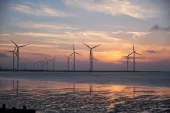Hong Kong needs to be more energy efficient
Buildings should be more energy efficient to save power to help transform Hong Kong into a low carbon city.
Michael K.H. Leung, associate dean and associate professor of City University of Hong Kong, said a survey in 2009 indicated that air conditioning and lighting account for majority of energy end-uses in Hong Kong, taking up 29% and 16%.
Leung said that he and his team are studying solutions to enhancing the energy efficiency of buildings. He said a technology called Heat Pump Air-Conditioner and Water Heater can be installed in private houses because of its small size. Energy saving amounts to 20% to 50%.
"Higher energy efficiency can be achieved by advanced technologies and innovations," Leung said.
Integrated Heat Pump is a system supplying air-conditioning and simultaneously recovering heat to produce hot water and is in widespread use in hotels and hospitals.



















 Advertise
Advertise







